Man Threatens To "Kick His Wife Out Of Bed" If She Doesn’t Get Up Early On Weekends To Feed The Cat - Interesting Family Dispute
Cats are creatures of habit, some more than others. When they get used to a certain feeding time, they will drive you nuts with their meowing every time you are late. As one person said, dogs have owners; cats have staff.
But it is just part of their charm, and we are all used to it (made peace with it, more likely). Today’s story is about a family cat and its refusal to ignore its parents’ sleeping late during weekends.
Basically, it wouldn’t care otherwise, but their sleeping messes up its feeding habits. Humans, where is my food?
That’s probably what it’s saying, but imagine it in cat language and with a very high pitch. And hearing it at 6 a.m. on a weekend morning.
“My wife and I have a happy, healthy (no chonkers) cat that we love, except for on weekends when he will sit outside our bedroom door and meow nonstop until one of us gets up to feed him. This only happens on weekends,” OP says.
“Monday to Friday, my wife wakes up for work first at around 6:00 a.m. and feeds the cat. However, on weekends, we both try to sleep in, so come 6:01 a.m., our kitty alarm clock goes off and won't shut up until one of us gets up to feed him. He will literally cry for two hours straight if we try to ignore him.”
An automatic feeder is a logical answer, right? Well, OP's wife doesn’t like the idea and has several pretty irrational (cat-person) reasons. So, our OP gave her an ultimatum.
Read the full story below:
OP asks:

OP and his wife have a cat. And it got used to a pretty strict feeding schedule

Workdays are not a problem because OP’s wife gets up early and feeds it. However, weekends are problematic

Exploring Household Dynamics and Responsibilities
The conflict around feeding the cat early on weekends reveals deeper dynamics within household roles and responsibilities. Dr. Emily D. Harris, a family psychologist at the University of Michigan, notes that disagreements over pet care often reflect underlying issues related to equity and shared responsibilities.
When one partner feels overburdened by responsibilities, it can lead to resentment and conflict. This situation is compounded in families where communication about roles isn't clearly established, leading to misunderstandings.
Understanding Power Dynamics in Relationships
This situation highlights the complex power dynamics often present in relationships, particularly in familial settings. Research indicates that control issues frequently arise when one partner feels overwhelmed or unrecognized in their needs. The man’s threat to kick his wife out of bed unless she complies with his demand may reflect deeper feelings of frustration and helplessness regarding shared responsibilities. According to studies in the Journal of Family Psychology, expressing needs through threats can create a toxic environment, leading to further conflict rather than resolution.
Recognizing these dynamics is crucial for both partners to foster healthier interactions.
Here is where the story takes a twist

OP’s wife listed the reasons she doesn't like the automatic feeder

And the reasons are not really valid

Furthermore, the emotional impact of perceived inequity can trigger defensive responses. Research shows that when individuals feel their contributions are undervalued, they may react with frustration or anger, which can escalate conflicts. Understanding the emotional context of these reactions can help partners approach the situation with greater empathy.
Recognizing that both partners may have different perspectives on responsibilities is crucial for resolving such conflicts.
From a psychological perspective, this behavior can also be tied to attachment styles formed during childhood. Dr. Philip Shaver's research on adult attachment shows that individuals with insecure attachment styles often resort to manipulation or threats to maintain control in relationships. This pattern can lead to conflicts that exacerbate feelings of inadequacy and resentment. Understanding these underlying motivations can help both partners address the root causes of their disputes rather than merely reacting to surface-level issues.
So OP gave her an ultimatum:

OP posted an edit:
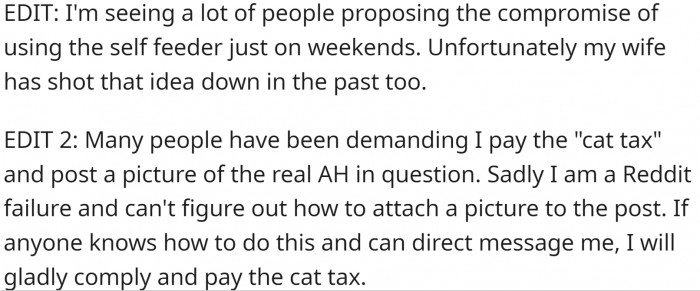
The cat that is responsible for this mess:
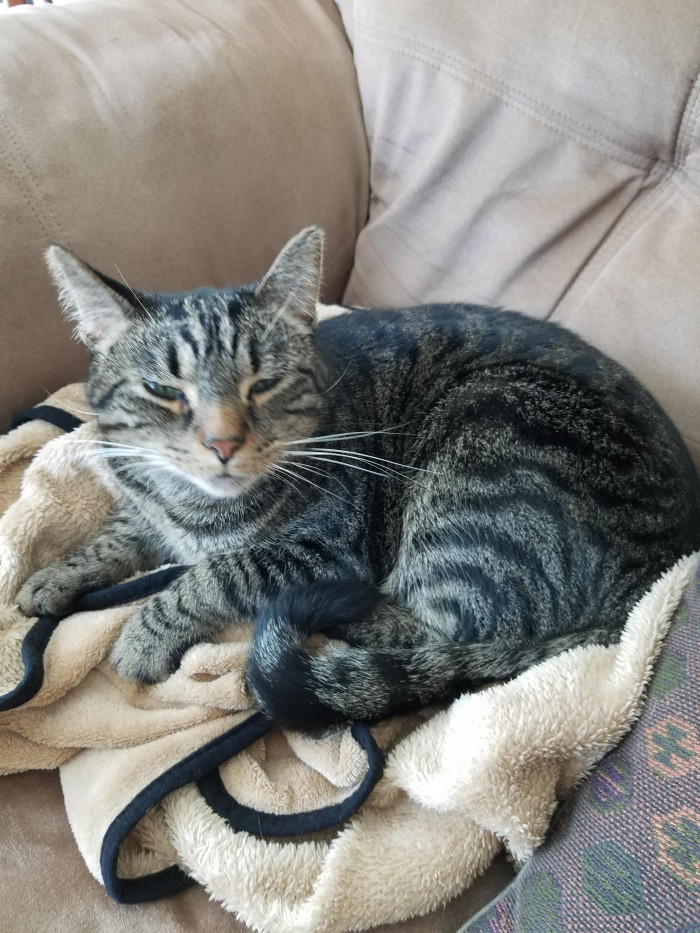
Effective Communication in Household Disputes
To navigate these types of disputes, effective communication strategies can be immensely beneficial. Dr. Marshall Rosenberg, known for developing Nonviolent Communication, emphasizes the importance of expressing needs and feelings without casting blame. By focusing on shared goals, couples can work together to find solutions that respect both partners' contributions.
For instance, discussing the reasons behind each person's schedule and responsibilities can help establish a more equitable arrangement that respects each partner's time and commitments.
The Importance of Healthy Communication
Effective communication is fundamental in resolving conflicts without resorting to threats or ultimatums. A clinical psychologist emphasizes that couples should focus on expressing their feelings and needs directly rather than using intimidation tactics. By employing techniques from nonviolent communication, couples can learn to articulate their emotions in ways that invite understanding rather than defensiveness. For instance, the husband could express his feelings about needing support in a way that encourages dialogue rather than ultimatums.
Research shows that open communication fosters emotional intimacy, ultimately leading to healthier relationships.
Redditors shared their experiences:
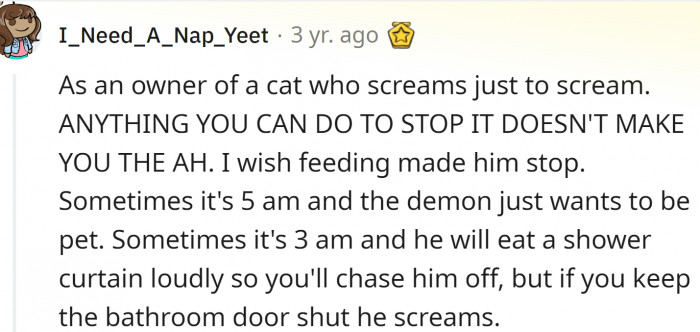
Dogs have owners, cats have staff...

She needs to get a grip...
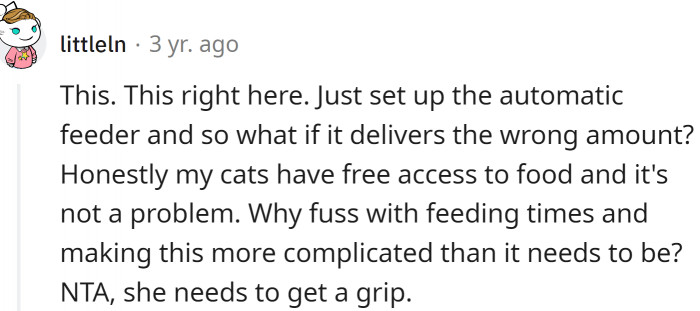
Additionally, establishing a routine for pet care duties can alleviate tension. Research indicates that creating clear agreements about household responsibilities can reduce stress and enhance cooperation. Couples can benefit from regularly scheduled check-ins to assess how well each partner is managing their roles, fostering accountability and open dialogue.
By collaboratively creating a system that works for both partners, they can ensure that both feel valued and respected in their contributions.
Additionally, it's essential to address the emotional needs of both partners. A study published in the Journal of Marriage and Family highlights the significance of mutual support and understanding in a relationship. Instead of issuing threats, couples should create a safe space for discussing their needs and concerns. This can be achieved through regular check-ins where both partners express their feelings and expectations. Such practices can enhance emotional connections and reduce the likelihood of conflicts arising from unmet needs.
This sounds a bit disturbing...
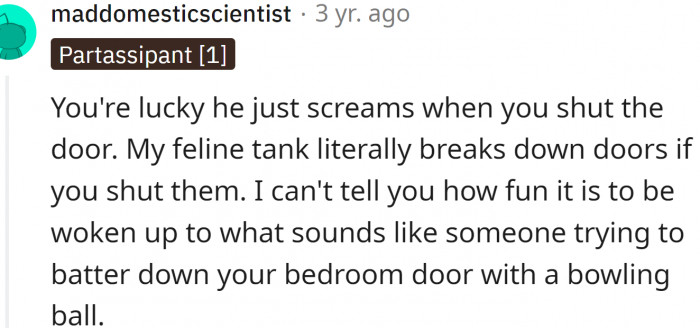
This cat clearly has its favorite person:
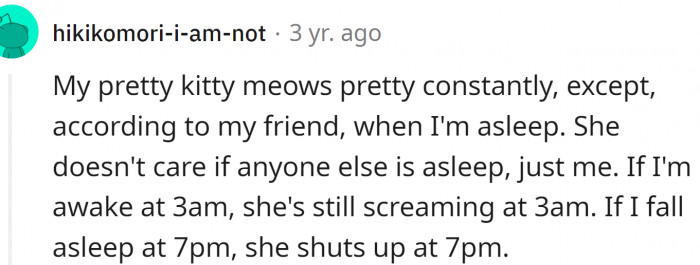
Well, AITA?
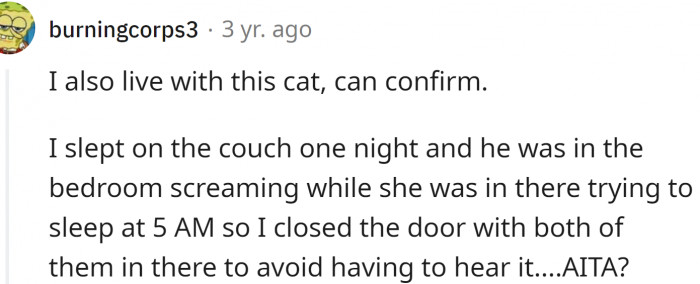
Practical Strategies for Conflict Resolution
To prevent conflicts from escalating into threats, couples can benefit from establishing ground rules for discussions. Research suggests that having clear guidelines can help partners feel safe expressing their needs without fear of retaliation. For example, agreeing to take timeouts during heated discussions can prevent harmful statements and give both partners time to cool down. Furthermore, engaging in couples therapy can provide essential tools for navigating conflicts constructively. Therapy offers a supportive environment where couples can learn to communicate effectively and resolve underlying issues.
Ultimately, these strategies can promote a healthier dynamic within the relationship.
Well, this was an entertaining story. And the comments that came from other Redditors certainly made it even funnier.
We bet that OP is feeling better and that he is not the only one with the same problem. However, it doesn’t solve it.
He and his wife should make a plan that suits them both, maybe leaving food for the cat in the evening. It might work if the cat doesn't show a tendency to overeat.
But it seems that the underlying issue is that the wife loves feeding the cat and enjoys seeing it happy when it gets food. To be honest, we cat owners don't get to see them show emotions very often :)
Psychological Analysis
This situation reflects a common tension in relationships where control and support can become distorted. The threat issued by the husband highlights an unhealthy approach to communication that could lead to further conflict. Encouraging open dialogue about needs and feelings can help both partners find common ground and strengthen their relationship.
Analysis generated by AI
Analysis & Alternative Approaches
In summary, understanding the power dynamics and communication styles at play in this relationship is crucial for fostering a healthier environment. By focusing on open communication and mutual support, couples can navigate their conflicts in more constructive ways. Research indicates that these efforts lead to greater relationship satisfaction and emotional well-being.
Analysis & Alternative Approaches
In conclusion, resolving household disputes over pet care requires open communication and a shared understanding of responsibilities. According to research in family psychology, approaching conflicts with empathy and clarity can significantly improve relationship dynamics.
By fostering a collaborative environment, couples can work together to create equitable solutions that honor each partner's contributions and emotional needs.



